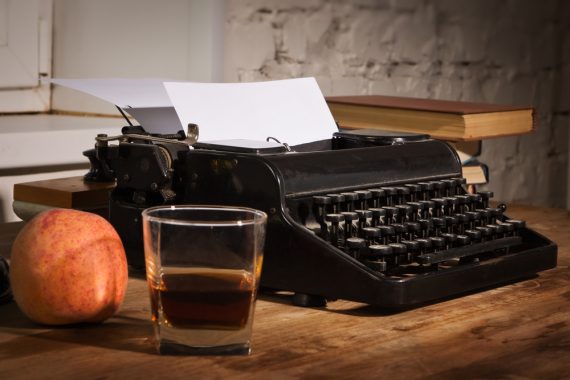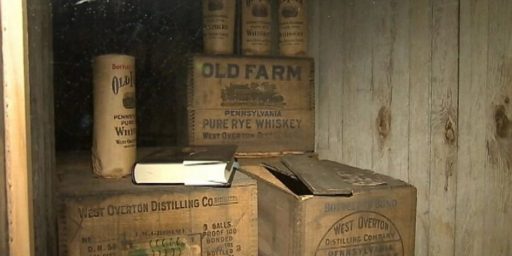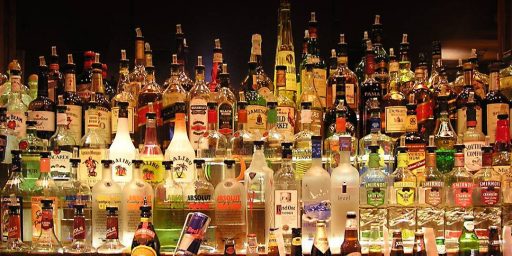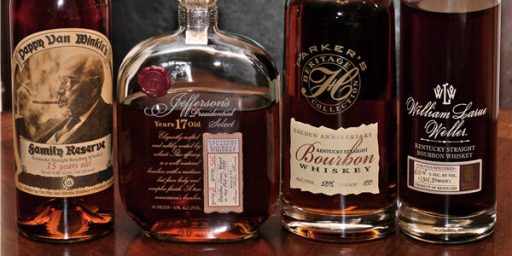Writing and Drinking
Many of America's great writers were alcoholics.
Adam Gopnik reviews for the New Yorker a new book exploring why it is that, for generations, our great writers were almost universally alcoholics. After quite a long summary of Olivia Laing’s The Trip To Echo Spring: On Writers And Drinking, he reflects,
If a theory is called for—and when is it not, in these woods?—to explain this phenomenon, it is that writing is work in which the balance necessary to a sane life of physical and symbolic work has been wrested right out of plumb, or proportion, and alcohol is (wrongly) believed to rebalance it. Anyone not a writer is probably sick of hearing how hard writing is, and obviously writing is not nearly as soul-destroying as coal mining or burger flipping or whatever you like. But writing is, if not uniquely hard work, then uniquely draining work. Some basic human need for a balance between thinking and acting is still kept intact even by the most tedious of other tasks. All rewarding effort involves a balance between wit and work—between the bits you do alone in your head and the bits you do in company with your hands (or voice or body or whatever). Laboring in your head, exclusively, does feels unnatural; whatever else we might have been doing, back out there on the primeval savannah, we weren’t sitting and moving the ends of our fingers minutely on a stone surface for six hours at a stretch.
The dramatic and plastic arts have elements of both wit and work intertwined—actors move around and shout, a director moves them (and shouts at them); painters have the sheer physicality of paint, and the givens of the canvas offer you four lines and a white surface to start with. A writer, on the other hand, stares out mournfully over the abyss of language—there are, truly, an infinite number of ways of forming the sentence you are about to attempt, all save one of them ugly and inadequate. And there’s nowhere to look for help but your own fingers.
The only cure, or hope, is to make the act of writing physical—to move it from your head to your gut—and, in doing so, to make it automatic, aerobic. That’s hard, and can be done in only two ways, both calling for outside assistance. One is to take the drug, or drink, and hope that it helps to ‘physicalize’ the work, move the pedals, and start the breathing—the theory used by those writers, like the elder Hemingway, who do the drinking and the writing simultaneously. Or else, to make the transition from mind to hand sober, knowing that the exhaustion it engenders will call for an antidote. Drained, one wants to replenish, and the whiskey or wine bottle is at hand. This is false reasoning of course, but it is the speciousness of writers.
Or was. No generalization about literature ever survives contact with the enemy, reality—doubtless there’s a young novelist in New York now writing her twelve-hundred-page opus on love and Brooklyn with a bottle of Jack Daniels in hand, and certainly Gary Shteyngart is doing his bit for the virtues of vodka. Still, there’s a general sense that the drugs of choice for writers now are more often little blue pills than big brown bottles. The onset of feminism, which compelled male writers at last to take some responsibility for their kids (one of the things that Laing’s writers certainly were not were present-tense dads), the diffusion of literary life from narrow bands of energy in London and New York and Paris into the academic monasteries of creative-writing programs—all of this has made the evening’s common cocktail a lost communion cup. (You can take the pill, and then send the kids to school.) Writers cope with the drain of writing now with yoga and meditation and marital discord (and, of course, with weed and Oregon Pinot, too) but the heyday of the writer with the whiskey bottle always on his desk seems past.
The price we pay for the end of the drinking life for writers is, perhaps, not so much isolation, though that is so: people can’t believe how few writers actually know other writers; the bars solved that for the old guys, at least. We also pay it, perhaps, in undue cheerfulness and extended youthfulness. The single most astonishing thing about the old-time writers Laing studies is how old they were when still young. Alcohol ages. Fitzgerald died just past forty, but everyone was already treating him like Rip Van Winkle. This was partly because he had out-lived his time but mostly because youth died then with the young. Now hair dye and twenty-four-hour gyms and wild salmon and celery juice or whatever have extended youth or the illusion of youth right to the edge of extreme old age.
I’ve come to enjoy the pleasures of alcohol relatively late in life, imbibing much more in my forties than in my twenties. But, with the exception of the occasional late-for-me evening live blog (or, increasingly, Tweet) of a political speech or debate, it has never had anything to do with my writing. My peak writing time, of which there has been less of late, is early morning and I seldom write anything after late afternoon; thus, it’s fueled only by coffee.
Then again, I imagine that writing fiction, especially the sort that’s more than thinly-disguised autobiographical fantasy, is of a different piece than political and cultural analysis. While certainly the late, great Christopher Hitchens was known—even if by his own accounts, somewhat apocryphally–as a booze hound, there’s no obvious benefit to inebriation in this genre; to the extent that he was prolific and intoxicated, it was despite, not because of, it. But it’s certainly conceivable to me that novelists trying to invent new worlds and characters out of whole cloth might more easily do so slightly less moored to reality. I’d venture, too, that even the great alcoholics do revisions sober.
The social aspect of Gopnik’s analysis is especially interesting, in that I’ve never viewed writing as a collaborative venture. It strikes me as necessarily solitary.
Whiskey and typewriter photo via Shutterstock







I’ve had some great ideas for fiction while I was inebriated. However, when I sobered up, I couldn’t remember what they were. Now I go to Dunkin’ Donuts for inspiration.
Nowhere else than the NewYorker!
I used to do a bit of writing from time to time (even got “published” on a couple occasions)(not paid) and I always found the above to be particularly true for me. Also, coffee was always what fueled my writing too, but not in the AM. As a union carpenter I was always up at 3;30 or 4 in the am and out the door soon there after. Any writing I did came after work. When I was younger I could drink coffee right up until 10 or 11 pm and fall right to sleep and any lack that came of such habits was papered over by youth. The day came when coffee was just not an option at a certain point in the day, then came an ulcer that really didn’t like coffee, then came persistent insomnia….
These days I just don’t have the stamina for writing. And it does take stamina. Write, rewrite, then rewrite again. Then pass it off for editing. Then rewrite again. I really admire someone like Michael or you who can do it. In either the above way, or to write it once and know it isn’t going to get any better by writing it again.
“there’s no obvious benefit to inebriation”
I recall Norman Mailer saying that the problem with drinking and writing is that you get sloshed, waddle up to the Secret of the Universe, and discover you’ve lost your vocabulary.
Two other writers and drinking stories.
Dashiell Hammett was very heavy drinker, and he just stopped. Lillian Hellman, his lover, asked him why he stopped. He said, “I promised my doctor I would, and I did.”
Elmore Leonard was also a heavy drinker, and he said he kept telling himself for years that if he stopped drinking, he would be bored. “I finally stopped drinking, and I’ve never been bored since.”
You might wonder why I seem to know so many stories about writing and drinking, well…
Writers will tell you, and Michael will attest, there is no high you can experience that is comparable — in any way — to the high a writer gets when he or she is in that groove, flat out, toes over the end of the board, on the very edge of that beautiful wave, and the words just flow out onto the page. Like nothing else in Tennessee.
Many years ago I recall reading an article entitled “Drink: The Curse of the Writing Class.” I think it was in the now-defunct Saturday Review. Interesting, but ultimately depressing, the sheer volume of alcoholic writers.
Writing is draining, but in an exhilarating rather than a debilitating way.
@sam:
Yep. Nothing like it.
@sam: Yes. Why I wrote.
Can’t wait until Mr. Reynolds pipes up. That is, if he’s had his morning drink yet.
Writing and alcoholism are indeed linked – when my father worked (as a reporter-photographer) for the Washington Star, at their location in Southeast DC, the Star owned the entire block….except for a tiny square of land that hosted – a liquor store!
I wonder if booze and male writers is the same as what I once heard about booze and male actors, that they turn to it as an expression of masculinity in an otherwise feminine profession.
Mike
Well yeah, you have kids now.
I did the math the other day for a fan, and if you printed all my published work out on standard paper and laid it end to end, you could drive the length of it going 60 mph for just under five minutes. So a lot.
By dint of DNA rather than any virtue of my own I never became an alcoholic. I’ve always just been a moderate drinker. But dependent to an extent, nevertheless. The essential uses for alcohol are 1) Any social occasion requiring contact with humans, and, more importantly, 2) Shutting down the brain at the end of the day.
I don’t find writing hard – I used to do actual work, work and trust me, this is easier. But writing is weird in that you live your life half in reality and half in whatever fictional universe(s) you’re writing. You run long conversations with imaginary people in your head. You think about story constantly, it’s like a program that runs in the background all the time. I mean, all the time. Unless you’ve had a few drinks.
Right now I’m writing two books set in two completely different worlds, but also thinking about the series I’m packaging (created but not writing myself) as well as two possible movie scripts, some digital shorts, a TV pilot, fans, tours, promo and of course new ideas for what to do next. And having written 150 books I probably have a hundred or so characters semi-alive in my head.
Basically, I drink at the end of the day to stop the voices in my head. Sort of like a schizophrenic, but I keep my stuff in my house and not a shopping cart.
But to bring it full circle, if I were blaming anyone for the Scotch bill it’d be my kids more than my job. I have teenagers. Two of them. If that doesn’t drive you to drink you’re a better man than I.
@MBunge:
Interesting thought. I’m in kidlit which is very female dominated. When I get together with peers we all drink, but yeah the guys probably more.
I would suspect the alcohol is to break down the left brain-right brain divide for the writer. Creativity and seeing the world without interpretation is a right brain function. But structured language, especially written language, words and sentences, is a left brain function. Rules and symbols with lots of analyzing. So when starting out, the writer finds the alcohol (or drug) helps them across the divide. Drawing, movement, etc. do not require such cooperation of the left brain and so may not require such inhibitors although many other artists do develop a fondness for the bottle. ‘Drawing on the Right side of the Brain’ offers techniques to force the left brain to cede control instead of rushing to interpret what the artist sees thus altering what comes out the hand.
The anecdote about Elmore Leonard above is interesting. Perhaps he developed the skills to lower the divide between hemispheres so when he stopped drinking, he didn’t lose his muse so to speak.
@JKB: I think that’s part of it, but I’ve also come to believe that writing — creative writing, whether in fiction or non — is just about the most intimate act one can commit. So much of what we write comes from the deepest recesses of our minds — places we don’t control and often don’t even know about. It can be really terrifying to confront what’s down there — and embarassing. Drinking can lower those inhibitions.
Writing is one of the professions where you can’t simply leave work at work. It is always with you. Couple this with a higher likelihood that the work is done at home and it is all that much more difficult to escape. A drink, a toke, or some other distraction can help put you in a different head space. That can be helpful at times and sometimes necessary.
I believe golf also does this. Golf requires one to be in the moment. To put away at least for the swing, those problems. I theorize this is why golf is so popular with executives.
There appears to be a link between verbal creativity, depression, and alchoholism. See http://www.ncbi.nlm.nih.gov/pubmed8733792.
Depressed people may use alcohol to self-medicate, even though alcohol is in itself a depressant. The study I cited above indicated that playwrights and prose writers were more prone to this than were poets.
in addition to being one, I’ve known a lot of writers, and yes, many of them do drink heavily and do suffer from affective disorders such as depression. Not all, of course. But a noticeable number.
There’s a good book on writers and depression: Unholy Ghost, edited by Nell Casey. It’s an anthology of pieces by writers who’ve dealt with affective disorders.
@CSK: Interesting. I have dealt with depression all my life. Most times it’s just there in varying degrees. Only once did it become debilitating. I actually stopped writing poetry because it seemed to be depressive. But I never really thought about it. I just decided to stop writing about depressing stuff.
I’ll bet the whole thing started like this (translated into a modern idiom):
Mrs. Ugluk: What do you have in that basket?
Ugluk: I found this bush in the woods with these berries. They looked kinda rotten, but I tasted one, and Whoa!
Mrs. Ugluk: Let me try one. Yikes!!
Ugluk: Yeah, interesting, huh?
Mrs. Ugluk: My head feels light. How many have you eaten? You’re walking funny.
Ugluk: I’m fine.
Mrs. Ugluk: You’re not talking fine. You’re slurring your words.
Ugluk: I’m fine, I tell ya. I’m gonna do somethin’. I got an idea.
Mrs. Ugluk: What?
Ugluk: It’s boring around here at night, sittin’ around, pickin’ bugs off each other, jist watchin’ the fire. C’mere kids. Gather around. Sit down. That’s it. Now, ya know that big bear that roams around the woods at night bellowin’ and roarin’. Well, he wasn’t always a bear. A long time ago…
@sam:
So I see you read my first book.
Maybe it is the other way. Maybe alcoholics tend to become writers.
Years ago I went to hear an author talk. To her writing was almost a bodily function, a need, something she had to do, on the order of eating or sleeping.
@Tyrell:
I may be overly cynical on this, but in general we talk “inspiration” and “bleeding onto the page” to civilians, and when it’s just us hanging out (in a bar, duh) we talk money. Don’t get me wrong, I enjoy writing. But it’s useful to have an organizing principal, and your choices as a writer are, self gratification, self expression, ego boosting, some notion of a holy mission, or money. Money is real and does real things, the rest of it is vague. If I want to write just to kill time, I come here. Otherwise, cha-ching me, baby.
@michael reynolds: Oh yes, indeed. When your characters start acting in ways you would have never dreamed of and all the while your fingers are tapping away at the keyboard there’s a constant line of “who ordered THAT?!” at the back of your brain.
Writing is like diving into a deep pool in a cavern with drowned lilies floating on the surface and hoping you’ll come back into the light and air again.
Writing, for me, is a drug. Which is why I indulge myself with it as little as possible and try to carry out activity in the real world instead. It would be far too easy to lose myself in the worlds I can create, with a definite opportunity cost. I’d much rather build a space elevator that write about building one.
(This isn’t to say that I think writers should be doing something else with their time. I know that for me, I have had to make that decision.)